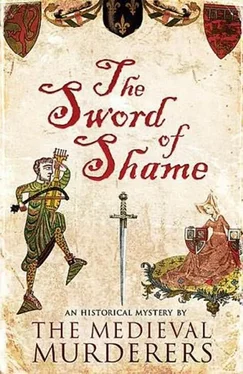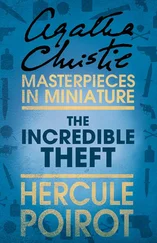The Medieval Murderers - Sword of Shame
Здесь есть возможность читать онлайн «The Medieval Murderers - Sword of Shame» весь текст электронной книги совершенно бесплатно (целиком полную версию без сокращений). В некоторых случаях можно слушать аудио, скачать через торрент в формате fb2 и присутствует краткое содержание. Жанр: Исторический детектив, на английском языке. Описание произведения, (предисловие) а так же отзывы посетителей доступны на портале библиотеки ЛибКат.
- Название:Sword of Shame
- Автор:
- Жанр:
- Год:неизвестен
- ISBN:нет данных
- Рейтинг книги:4 / 5. Голосов: 1
-
Избранное:Добавить в избранное
- Отзывы:
-
Ваша оценка:
- 80
- 1
- 2
- 3
- 4
- 5
Sword of Shame: краткое содержание, описание и аннотация
Предлагаем к чтению аннотацию, описание, краткое содержание или предисловие (зависит от того, что написал сам автор книги «Sword of Shame»). Если вы не нашли необходимую информацию о книге — напишите в комментариях, мы постараемся отыскать её.
Sword of Shame — читать онлайн бесплатно полную книгу (весь текст) целиком
Ниже представлен текст книги, разбитый по страницам. Система сохранения места последней прочитанной страницы, позволяет с удобством читать онлайн бесплатно книгу «Sword of Shame», без необходимости каждый раз заново искать на чём Вы остановились. Поставьте закладку, и сможете в любой момент перейти на страницу, на которой закончили чтение.
Интервал:
Закладка:
‘Near enough. It amused us.’
‘So I see. Where were you on the Friday Coule died?’
‘Me?’ Roger blinked with surprise. ‘I was out hunting with my raches. I have several pairs of them as well as greyhounds.’
‘You were not in the castle?’
‘No!’
‘I see. Tell me: what is the cause of your enmity with this knight?’
‘It’s nothing. Not now.’
‘Humour me.’
Roger appeared to hestitate. ‘Many years ago our lands were in the control of the king. Our old manor of Bradninch escheated to the king.’
‘Bradninch was forfeit to the crown?’ Simon said with surprise. When a lord died without issue, his land reverted or ‘escheated’ to the king, his lord. But since there was an heir here telling Simon about the story, the land must have been taken for some other reason; perhaps because of a serious offence: treason. ‘That must have been a long time ago.’
‘Over a hundred years…perhaps a hundred and fifty. In any case, the king gave it to a Curterne, and it was lost to us. It’s not in the forefront of our minds, but it means we can enjoy the discomfiture of the Curternes when something goes wrong for them.’
‘Your family recovered its fortunes?’
‘After a while. After a fashion.’ Roger became quiet then, musing, before saying, ‘As I say, it doesn’t upset us now. It was a very long time ago.’
‘So to return to Coule-you say that almost any of the peasants could have had reason to wish him dead?’
‘The folk on Curterne’s lands, yes. Curterne owns territory all over the county, but it’s at Down St Mary where he really has trouble. That’s where Coule was in charge.’
‘I know of it,’ Baldwin said.
Simon knew the area. When he and Baldwin had first met, they had ridden out that way in pursuit of trail-bastons who had slaughtered a party of travellers. Down St Mary was a pleasant vill in rolling hills north and east of Bow, while Nymet Tracy was south. Bow had been created sixty years before as a new town so that the Tracys could take advantage of the income that a market and fair could bring, and they had set aside land on a busy road. They would sell blocks to merchants to come and build houses, and so far as Simon was aware, the market was thriving. It would bring in a goodly sum to the master who owned the place.
‘So you and your family own the market at Bow?’ Simon said. ‘I doubt whether there’s any need for you to be jealous of losing Bradninch, then.’
‘You think so?’ Roger snapped. ‘Do you know how much money they make at Bradninch market every week?’
Simon smiled. For all Roger’s protestations that the affair was far in the past, it clearly still rankled. ‘Don’t you make enough at Bow? It has always looked busy enough.’
‘Perhaps that is so,’ Roger agreed and stared at the ground. ‘But when you are a second son like me, all you see is what you’ve missed out on. If that had been our land still, I could have gone there to look to my older brother’s interests. As it is…another has the advantage. And my family is deprived of our natural inheritance.’
‘Does your brother feel as upset as you?’ Baldwin enquired.
‘Sir William used to be, years ago, but not now,’ Roger’s tone became cold and a little distant.
‘He has a castle, I suppose,’ Simon said, unable to stop himself rubbing salt into the wound.
‘And money, yes, but that’s not it. My brother is extremely pious. You know, if our roles were reversed, I think that he would be delighted.’
‘If he were younger, you mean?’ Baldwin pressed.
‘Yes. If he were the idle one, and I were the knight with the demesne, he would be perfectly content. He would go to a convent and retire from the world without a second thought. The life would suit him. He has always had a hankering for prayer. The idea of being able to abase himself at the cross every day would appeal to him immensely.’
‘I see,’ Baldwin said, but in his mind’s eye he saw a man gripped with fury in the knowledge that his property had been taken, gripping one of the few remaining family treasures of any value in both hands and using it to hack at a thief.
No matter how religious a man was, being robbed could deprive even a monk of the inclination to turn the other cheek.
Alice de Tracy heard the hooves approaching and felt her heart begin to thud painfully. She lived in perpetual dread of the future now, and those hoofbeats sounded like the drums of doom.
Waving irritably at the maid brushing her hair, she rose from the stool and stood indecisively, unwilling to go straight to the window. Instead she snapped at the maid to leave, and only when the door had closed, the wooden latch dropping into its slot, did she hurry to the window.
The yard was in its usual state of busyness. Henry the under-groom was grooming Sir William’s great horse while it tried to nip and kick at him; stable-boys were fetching fresh hay and sweeping out the old straw; the steward was shouting at the brewery, demanding to know what had happened to the gallon of strong ale he’d ordered earlier, and all in all the place was a mess. It was into this commotion that the riders came, led by Roger.
Her lips compressed into a thin line. She knew that it was Denis’s idea to fetch someone, but she would have hoped for another messenger to have been sent. Roger had demanded the right to go, and the very presumptuousness of his action made her feel a cold dread. He could have soured the keeper and his companion against her and her husband. It was the sort of thing Roger would do.
The two with him were used to authority. One, the elder of the two from his greying hair, appeared to be a knight, and not one of those modern, primping coxcombs, but a fighting man. He had the breadth of shoulder, the muscled arms, and the air of command. If she had to guess, he was the keeper.
When she looked at the other, she saw a younger man, perhaps only ten years senior to her own two-and-twenty years. Still, from the way he cocked his leg over his mount’s neck and slid quickly to the ground, standing with the arrogance born of confidence, she wondered fleetingly whether her estimation might have been wrong. But then she lost interest in the two men as she caught sight of Roger, staring up at her with a vindictive smile on his face.
It chilled her blood.
The castle was only small, obviously built early in the days after the pacification of the country. William of Normandy had given tracts of lands like this to all his most loyal vassals and mercenaries after the invasion, the only stipulation being that the recipients of his largesse should build their own strongholds to keep the peasants under control.
A low motte had been built, and at the top stood a stone keep. Over the years the original single tower had been expanded, and now there was a thatched hall at its foot, stables, a brewery, storehouses, and even a small blacksmith’s, all enclosed within a sturdy wall of grey moorstone. When their horses had been led away to be fed and watered, Roger led them up a staircase to a doorway on the first floor of the hall. There he stood aside to let the guests enter.
‘Madame de Tracy, I am pleased to meet you,’ Baldwin said as he entered the hall.
‘You know me?’
‘I have heard of your beauty, madam-and your brother-in-law said you were here,’ he admitted with a smile.
She smiled, and Baldwin was pleased to see that the appearance of nervousness and fear left her as she did so. Dimples appeared in both cheeks, and her blue eyes seemed to light with an inner glow. ‘You are generous, friend.’
‘My name is Sir Baldwin de Furnshill, and I am the Keeper of the King’s Peace. This is my companion, Bailiff Simon Puttock, the Keeper of the Port of Dartmouth under the Abbot of Tavistock.’
Читать дальшеИнтервал:
Закладка:
Похожие книги на «Sword of Shame»
Представляем Вашему вниманию похожие книги на «Sword of Shame» списком для выбора. Мы отобрали схожую по названию и смыслу литературу в надежде предоставить читателям больше вариантов отыскать новые, интересные, ещё непрочитанные произведения.
Обсуждение, отзывы о книге «Sword of Shame» и просто собственные мнения читателей. Оставьте ваши комментарии, напишите, что Вы думаете о произведении, его смысле или главных героях. Укажите что конкретно понравилось, а что нет, и почему Вы так считаете.












